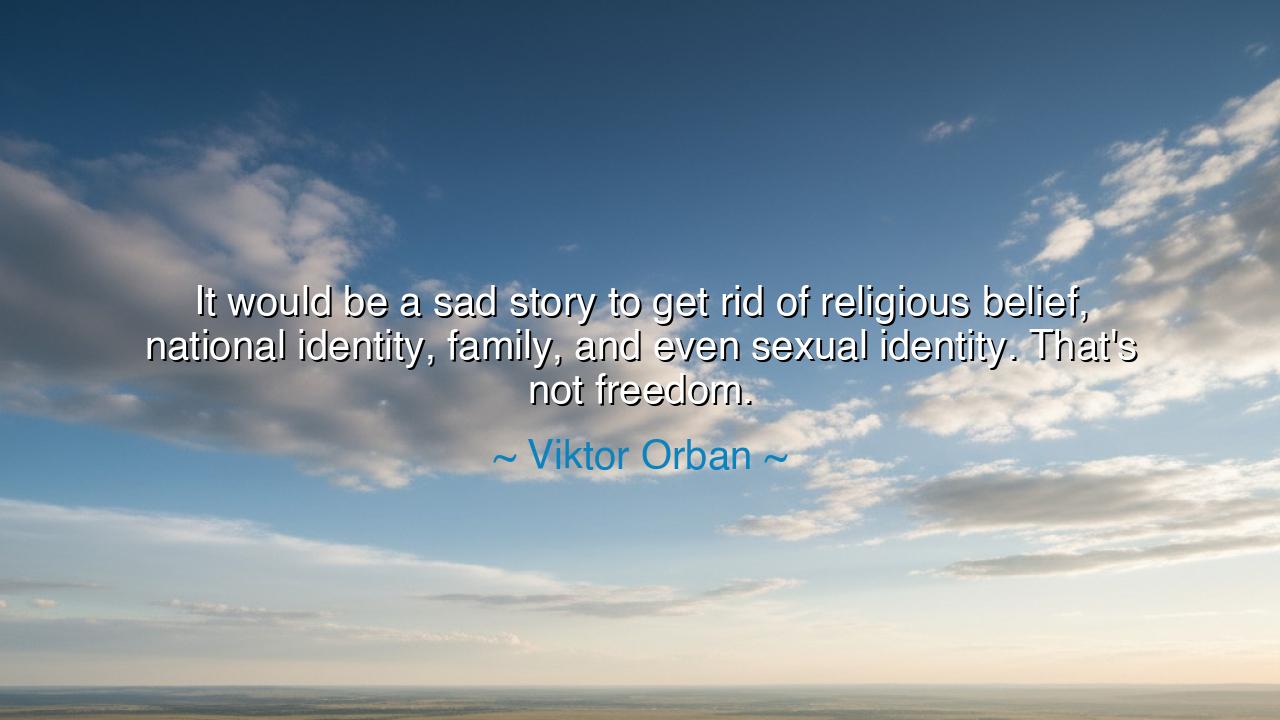
It would be a sad story to get rid of religious belief, national
It would be a sad story to get rid of religious belief, national identity, family, and even sexual identity. That's not freedom.






Hear now, O children of wisdom and guardians of heritage, the words of Viktor Orbán, a man speaking from the crossroads of modernity and memory: “It would be a sad story to get rid of religious belief, national identity, family, and even sexual identity. That’s not freedom.” In this declaration lies not merely a political sentiment, but a profound warning to the human soul. It is a reminder that true freedom is not found in the destruction of what defines us, but in the preservation of those roots from which meaning and dignity arise.
The origin of this quote lies in the social and political transformations of Europe in the 21st century—a time when globalism, technology, and ideology began to blur the boundaries that once gave humanity form and belonging. Orbán, Prime Minister of Hungary, spoke as one who saw his nation’s traditions endangered by forces of cultural erosion. His words cry out like those of the ancients who, watching empires rise and fall, understood that a civilization that forgets its sacred bonds becomes a house without a foundation. His statement is not only about Hungary—it is about mankind, standing between inheritance and amnesia.
When he speaks of religious belief, he invokes the oldest pillar of human existence: the quest for the divine, the sense that life has meaning beyond material survival. To abandon faith is to cut oneself adrift in an ocean of uncertainty. For thousands of years, from the temples of Egypt to the cathedrals of Europe, religion has been not merely ritual but the architecture of the soul. A people who reject the sacred lose not only God, but their own reflection in eternity.
When he speaks of national identity, Orbán recalls the power of belonging. A nation is not a flag or a border alone; it is the shared memory of sacrifice, song, and struggle. It is the unbroken chain that binds ancestor to descendant. Consider the fall of Ancient Rome, when citizens ceased to feel Roman, and the empire crumbled not from invasion but from forgetfulness. So too, when modern men renounce their nations in the name of progress, they risk becoming strangers to themselves, citizens of nowhere.
He speaks also of family, that sacred hearth where love is learned, where the heart first knows both duty and mercy. The family is the smallest nation, the first school of loyalty. History is filled with empires that perished when the family unit dissolved—when children ceased to honor their elders, and love became mere appetite. From Confucius to Tolstoy, the wise have known that no society can stand where the family falls, for it is the root from which all virtues grow.
And finally, Orbán speaks of sexual identity, not as a mere social category, but as one of the elemental truths of being human—the awareness of one’s nature, the dance of difference that makes life fruitful. To erase this, he warns, is to erase the poetry of existence, to make the human heart mechanical. Freedom, when stripped of identity, becomes a void—a boundless expanse where no self remains to choose or cherish.
From this reflection arises an ancient lesson: that freedom is not the absence of limits, but the harmony of structure and spirit. A tree does not grow by cutting its roots; a bird does not soar by denying its wings. To preserve faith, family, and identity is not to reject freedom, but to anchor it in truth. True liberty is born from belonging—from knowing who you are and where you come from, and yet choosing to live with dignity among others.
Practical wisdom flows from his words. Honor your roots. Protect your traditions. Cherish your family. Defend your faith. Do not let the noise of the modern age persuade you that love of heritage is hatred of progress. The world does not need rootless men, but grounded souls—those who remember that to be free is not to drift, but to stand firm in the winds of change. Thus, let Viktor Orbán’s words echo across generations: freedom without identity is emptiness, and only those who remember where they came from can truly choose where they are going.






AAdministratorAdministrator
Welcome, honored guests. Please leave a comment, we will respond soon